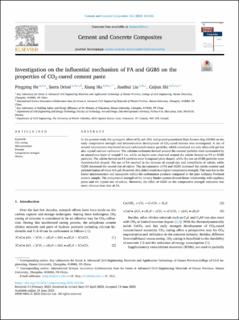Investigation on the influential mechanism of FA and GGBS on the properties of CO2-cured cement paste
Peer reviewed, Journal article
Published version
Permanent lenke
https://hdl.handle.net/11250/3100143Utgivelsesdato
2023Metadata
Vis full innførselSamlinger
Sammendrag
In the present work, the synergetic effect of fly ash (FA) and ground granulated blast furnace slag (GGBS) on the early compressive strength and microstructure development of CO2-cured mortars was investigated. A rim of several micrometers was found around carbonated cement particles, which contained not only silica-rich gel but also crystal calcium carbonate. The calcium carbonate formed around the cement particles were surrounded by an amorphous layer of around 3 nm, while no layers were observed around the calcite formed on FA or GGBS particles. The calcite formed on FA particles were hexagonal plate shaped, while the one on GGBS particles were rhombohedral shaped. The use of FA resulted in the increase of crystal size and crystallinity of calcite, while GGBS decreased the crystal size of calcite. The incorporation of FA and GGBS increased the calcite content and polymerization of silica-rich gel. However, this didn’t result in a higher compressive strength. This was due to the looser microstructure and nanopores within the carbonation products compared to the pure ordinary Portland cement sample. The compressive strength of the ternary binder system showed linear relationship with capillary pores and the crystal size of calcite. Moreover, the effect of GGBS on the compressive strength reduction was more obvious than that of FA. Investigation on the influential mechanism of FA and GGBS on the properties of CO2-cured cement paste

